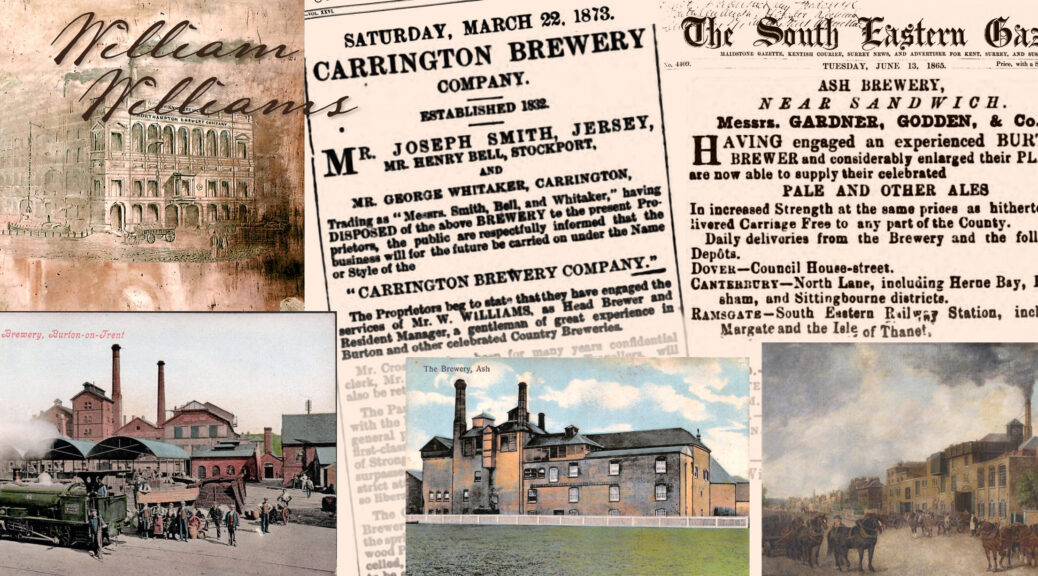
Other than wondering how one survived childhood with first and last names almost the same, I hadn’t thought much about my 2nd great grandfather, William Williams. I had him in the family tree and knew he was born in 1840 in Elberfeld, Germany, but lived in England as an adult, dying in Forest Hill, London in 1907. I don’t think we have a beer brewer anywhere else in the family tree, but William picked about the best time to get into the beer brewing business as it was booming in England in the mid- to late-1800s. He moved frequently from one beer-brewing town to the next in England and Germany and managed to make a decent living along the way. Not bad given the very rough start he had.
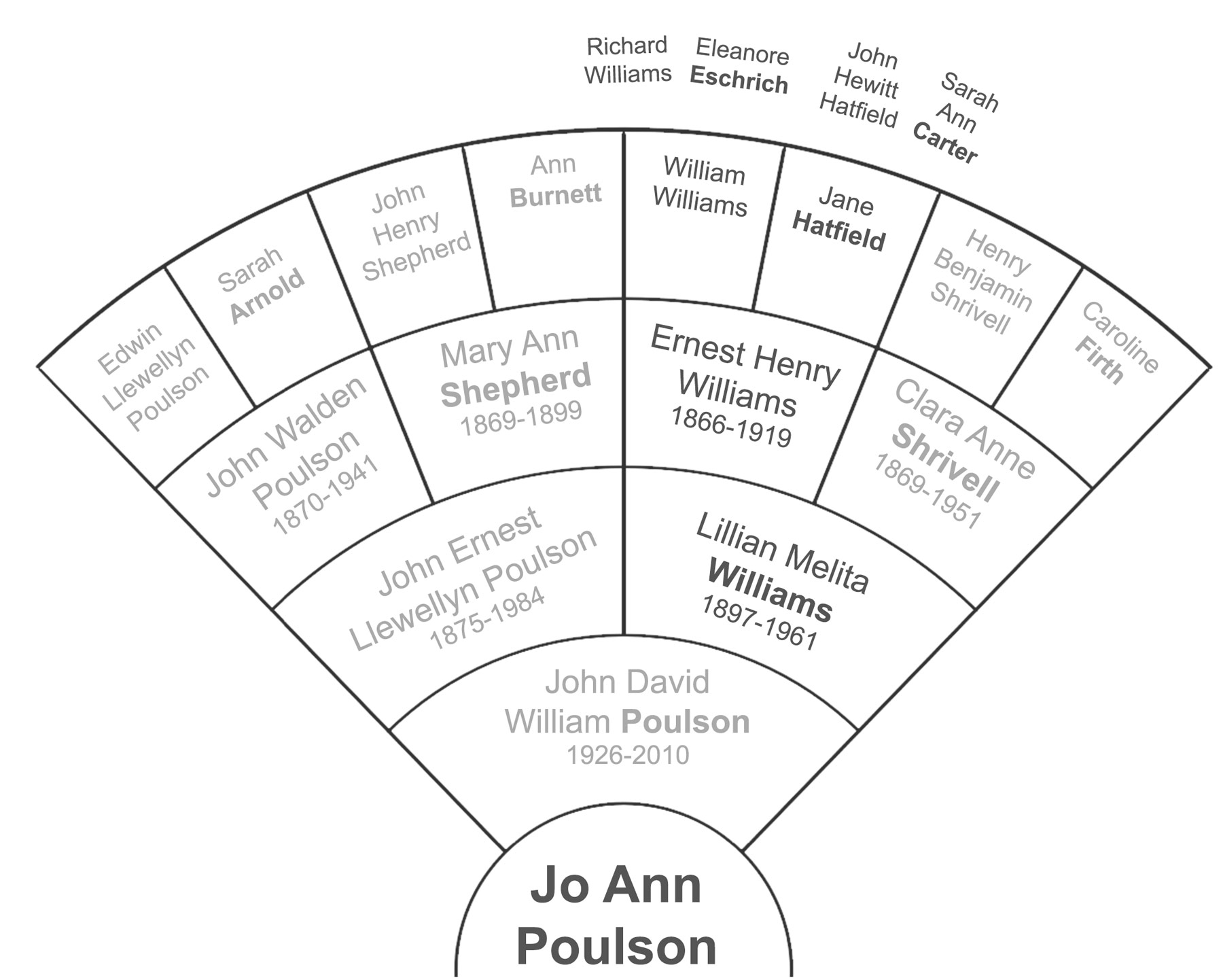
I think it will help in following William Williams’ story if I repeat a version of the bow tie charts I used in an earlier blog post about my family tree. I’ve tacked William and Jane’s parents on as they get mentioned a time or two (and Jane’s family will be getting their own blog post as there are great stories there as well).
I “met” a first cousin via family history research who had been diligently pursuing information about William’s parents, Richard Williams, a civil engineer, and his German wife, Eleonore Eschrich. Eleonore and Richard were married in 1829 in Germany, where Richard worked as a teacher. We don’t know what took Richard to Germany or when he left England – the national census only started in 1841 which makes it harder to flesh out stories.
I had been able to find additional details – where Richard was baptized (although we still have no idea why that was in Jersey) and via the wonderful British Newspaper Archive that he had died in Philippeville, Belgium (we still have no idea why he was in Philippeville).
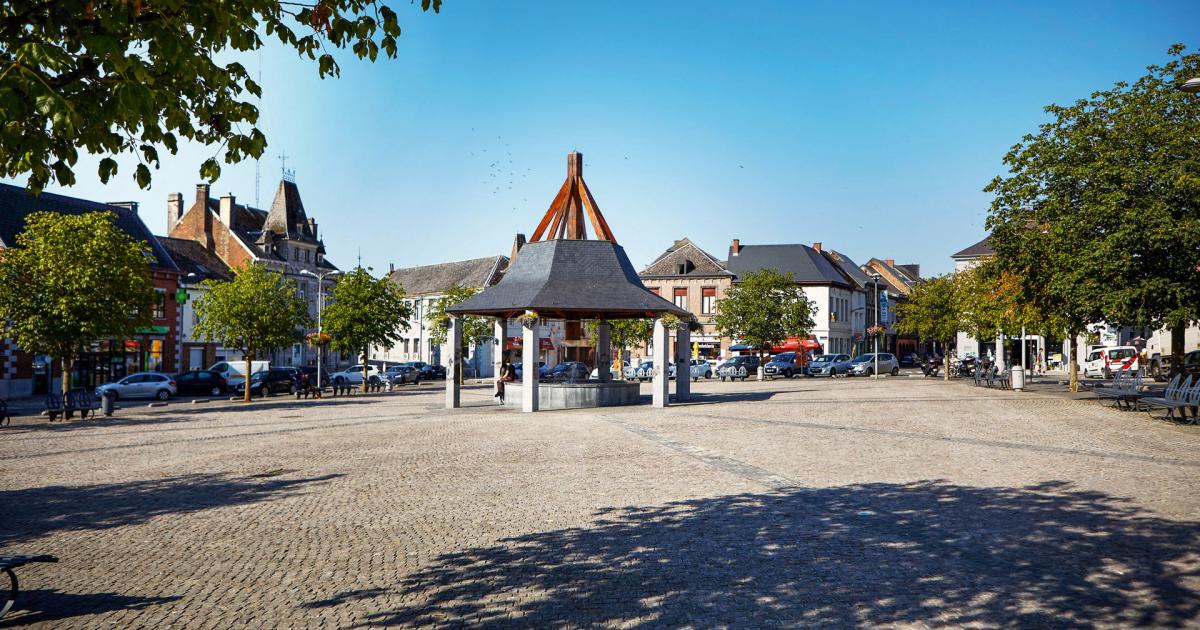
When my cousin found Richard’s detailed Belgian death record (excellent civic records) my school French and Google translate revealed some startling details. When Richard died in June 1851 (at 49), he was already a widower – meaning his children were now orphans. William, the youngest, was a month shy of his 11th birthday. We don’t know if the children were all with Richard in Philippeville, but haven’t been able to find them in England until the 1861 census. Their German grandfather had been dead since Richard & Eleonore married, and both of Richard’s parents were dead when Richard died (thanks again to the detailed Philippeville records), so other than his older siblings – Charlotte, 17, Richard, 16, and Owen , 13 – William was on his own.
But there was Ellen Williams. During recent newspaper searches, I had come upon an announcement from Charlotte (by then Lady Youl) of the death of her “beloved sister” in 1897. After a bit more digging, it became clear that Ellen Williams was an older sister, born in London in 1830 – perhaps Richard & Eleonore came back to introduce Eleonore to family? The family was living on Lambeth Road in London. Ellen’s name in the parish baptism register was Elonore Forella Williams – I have to assume she didn’t like it as I can find no other paperwork in that name.
The UK 1851 census was taken on March 30 and Ellen was a teacher at a Ladies Seminary in Bexley, Kent. I have no idea when she returned to England – or even if she had lived in Germany with her younger siblings, but I have to assume so. The other four Williams children were born in Elberfeld starting in 1833. Possibly Ellen left for England when Richard moved to Philippeville? She might have traveled to help the younger children during the summer after Richard’s death, assuming the Ladies Seminary had summer holidays.
William’s older brother Owen was married in London in August 1857 when he was only 19 – he said he was of “full age” (i.e. 21). It’s unlikely that William was with Owen, and right after the wedding, Jane was pregnant and she and the children moved in with her parents in Brighton. Owen (an engineer, but I don’t know what kind) left for India around 1863 and died there in 1865, leaving his wife Jane a 29 year old widow with four children (one of whom sadly died just after her father).
William’s other brother, Richard, was married in Victoria, Australia, in 1856 at age 22. I’m not sure when he left England or how he managed to pay for his passage, but he remained in Australia until he died in 1911.
By 1861, William’s sister Charlotte was a governess in West Ham and William is a brewer in Burton-on-Trent, lodging with another brewery employee on Cross Street. I don’t know how he learned his trade – possibly he had been apprenticed somewhere after his father died.
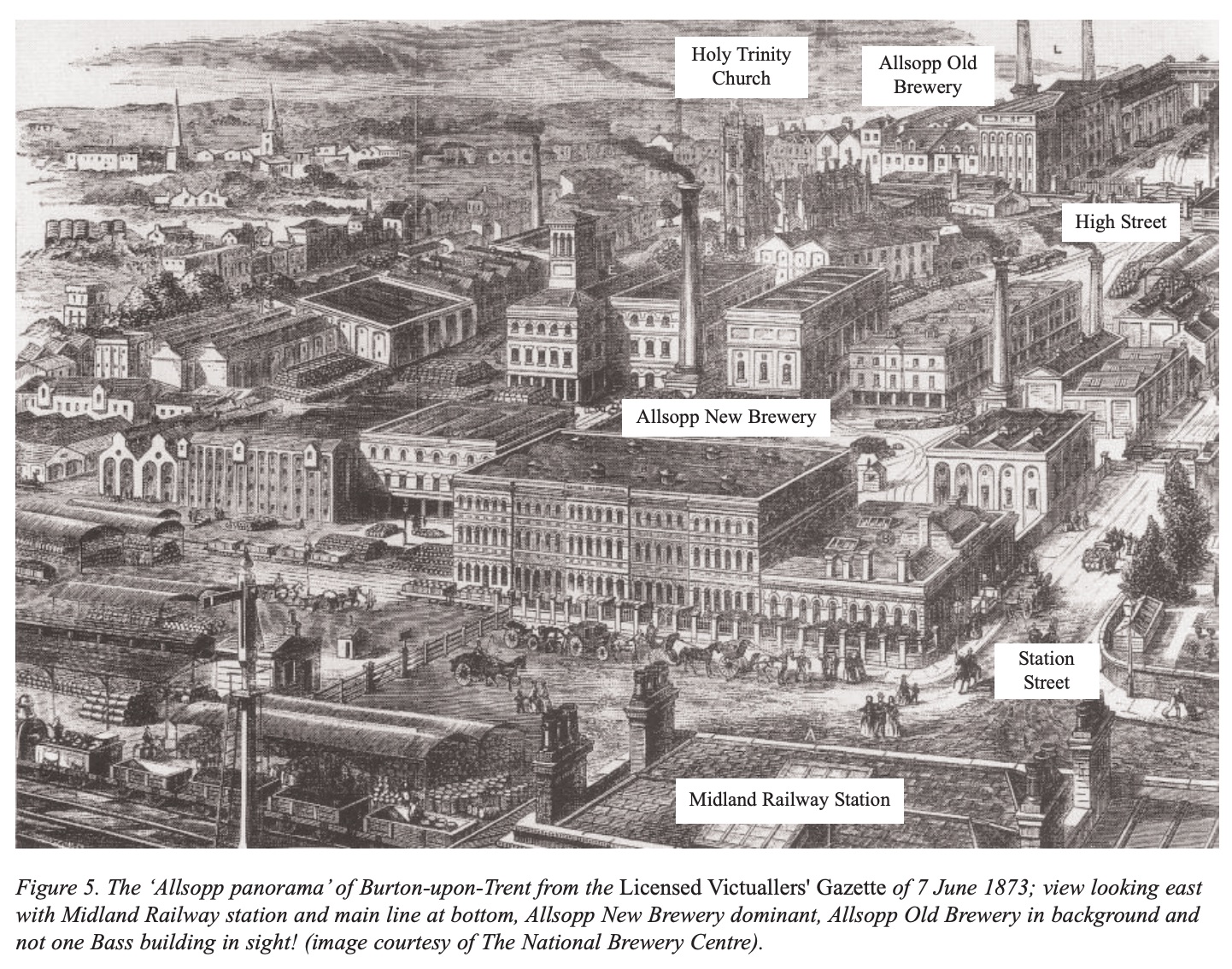
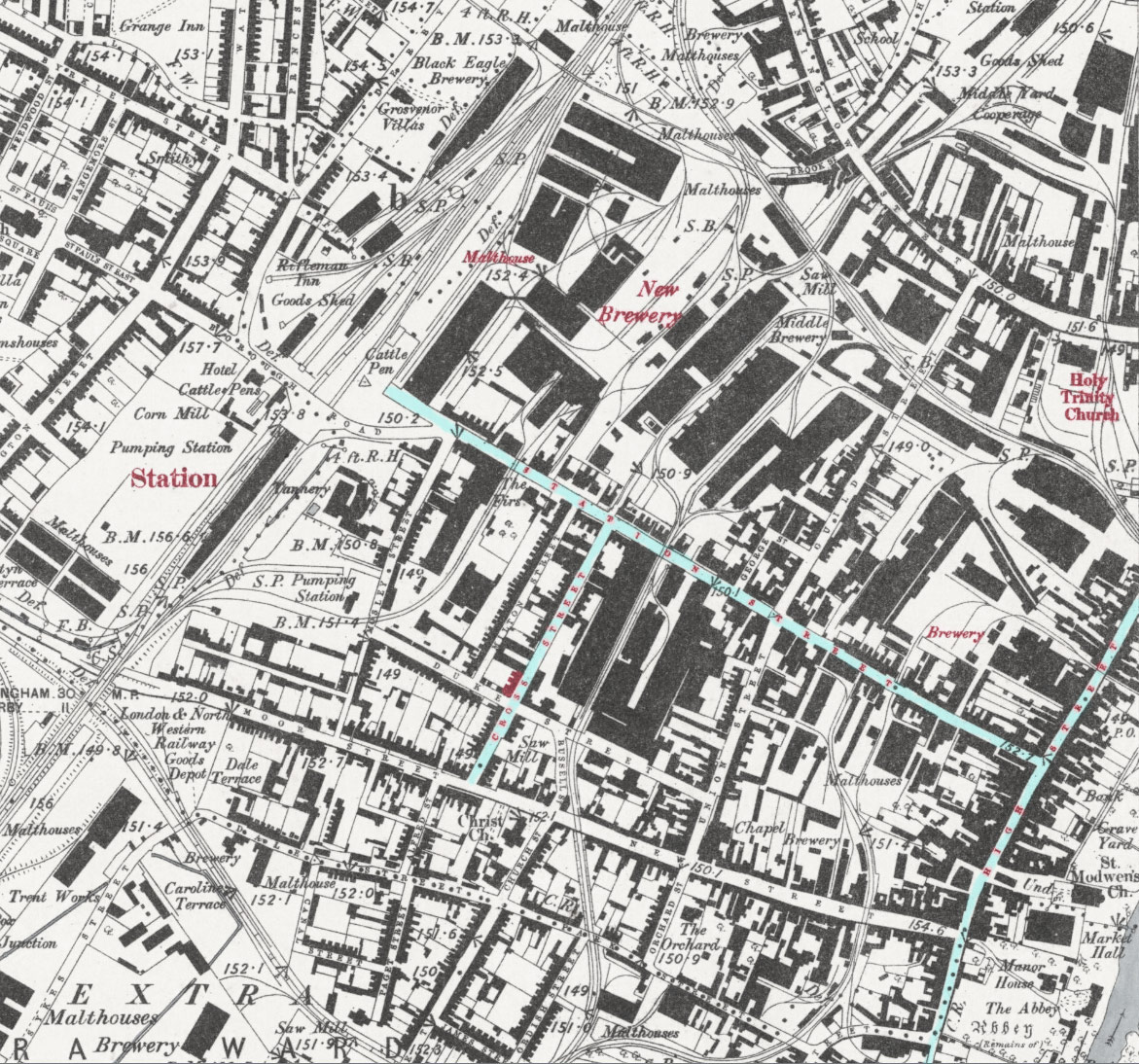
When I looked at Cross Street on an 1882 Ordnance Survey map I realized (a) William could walk to work and (b) Burton-on-Trent had a huge number of breweries and malthouses. An absolutely great place for a 21-year-old brewer to gain valuable expertise. A Burton paper claimed in early 1861 that Burton (all breweries) had produced about half the entire ale output of Britain in 1860. Even if you look at Google Street View today, the roads around Cross Street are surrounded by breweries.
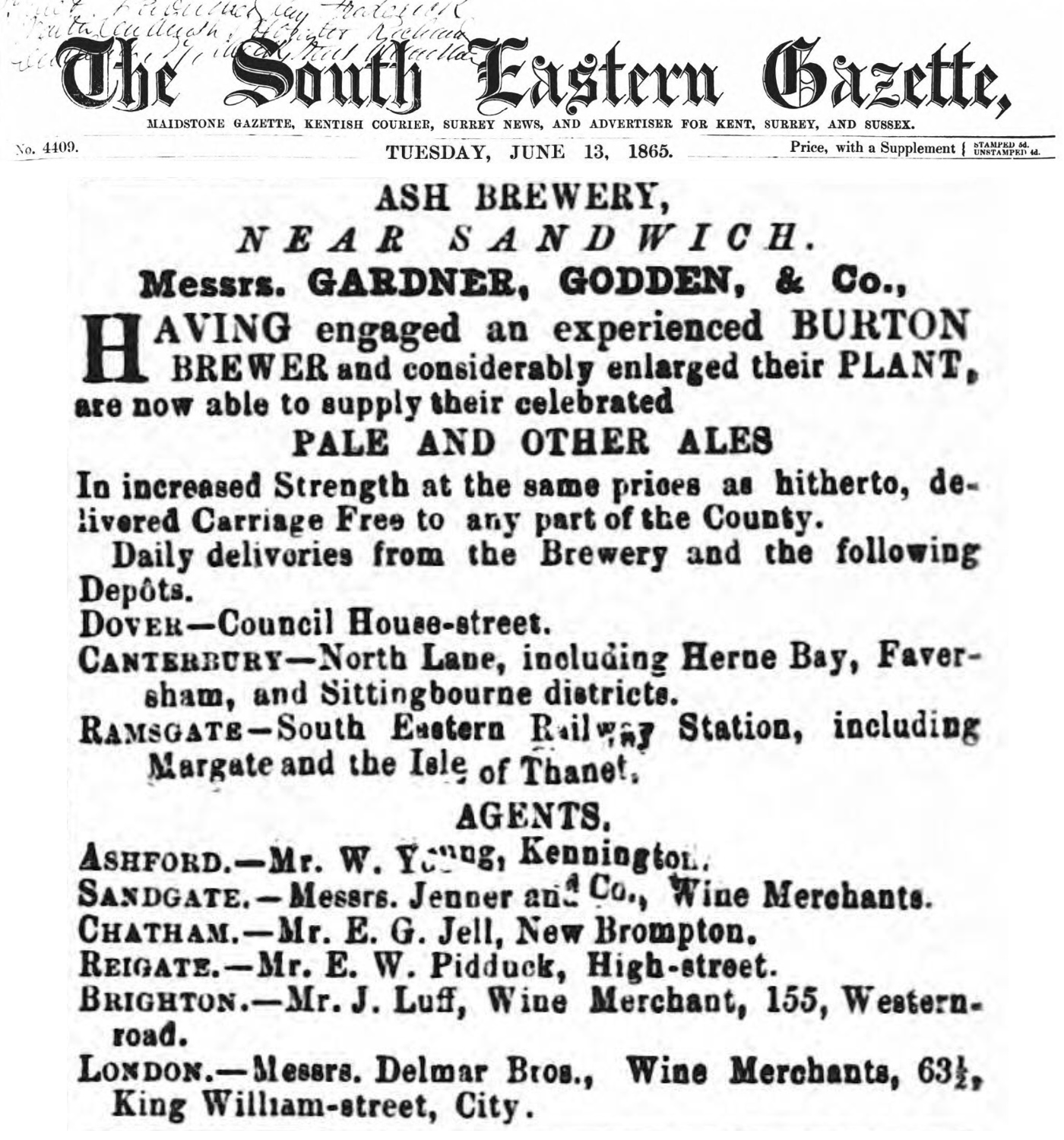
William didn’t stay long in Burton. When he married in St. James, Westminster in April 1864, his address on the marriage certificate was Ash, Kent, the same place his first two children were born. Looking at an old Ordnance Survey map I wasn’t surprised to see a large brewery on the outskirts of this tiny village near Sandwich. Some searching in the newspaper archives found the ad above from 1865 which has to be referring to hiring William Williams. I don’t know how long he stayed there, but at least until his second son (my great grandfather) Ernest Henry Williams was born there in December 1866 and baptized in January 1867.
A side note: William married Jane Hatfield, daughter of a “surgeon-dentist” with offices in upscale parts of London. I can’t imagine how the two of them met – she was 19 when they married and as far as I know, the Hatfields had no relatives or business in Ash or anywhere nearby. John Hewitt Hatfield, Jane’s father, was himself someone from humble beginnings – a watchmaker’s son from Leicestershire – who in 1863 had become a Licentiate in Dental Surgery, Royal College of Surgeons, England. I would guess he’d approve of William’s up-from-nothing story given his own.
The Williams family wasn’t in England for the 1871 census and a clue from their third son’s birth certificate explains why. When Walter Richard Williams was born in Holloway in August 1868, Jane Williams listed her residence as Hamburg, even though Walter had been born at 43 Gloucester Road. It’s not clear if William had left Ash to work for a London brewery and then took another job in Hamburg, or if Jane just stayed in London for a while, relatively near her parents, because her pregnancy was too far along to travel. I’ve looked for some newspaper stories to fill in the Hamburg gig, but so far nothing. I’m assuming that William spoke German given it was his mother’s language and he was raised there – a plus when seeking work there.
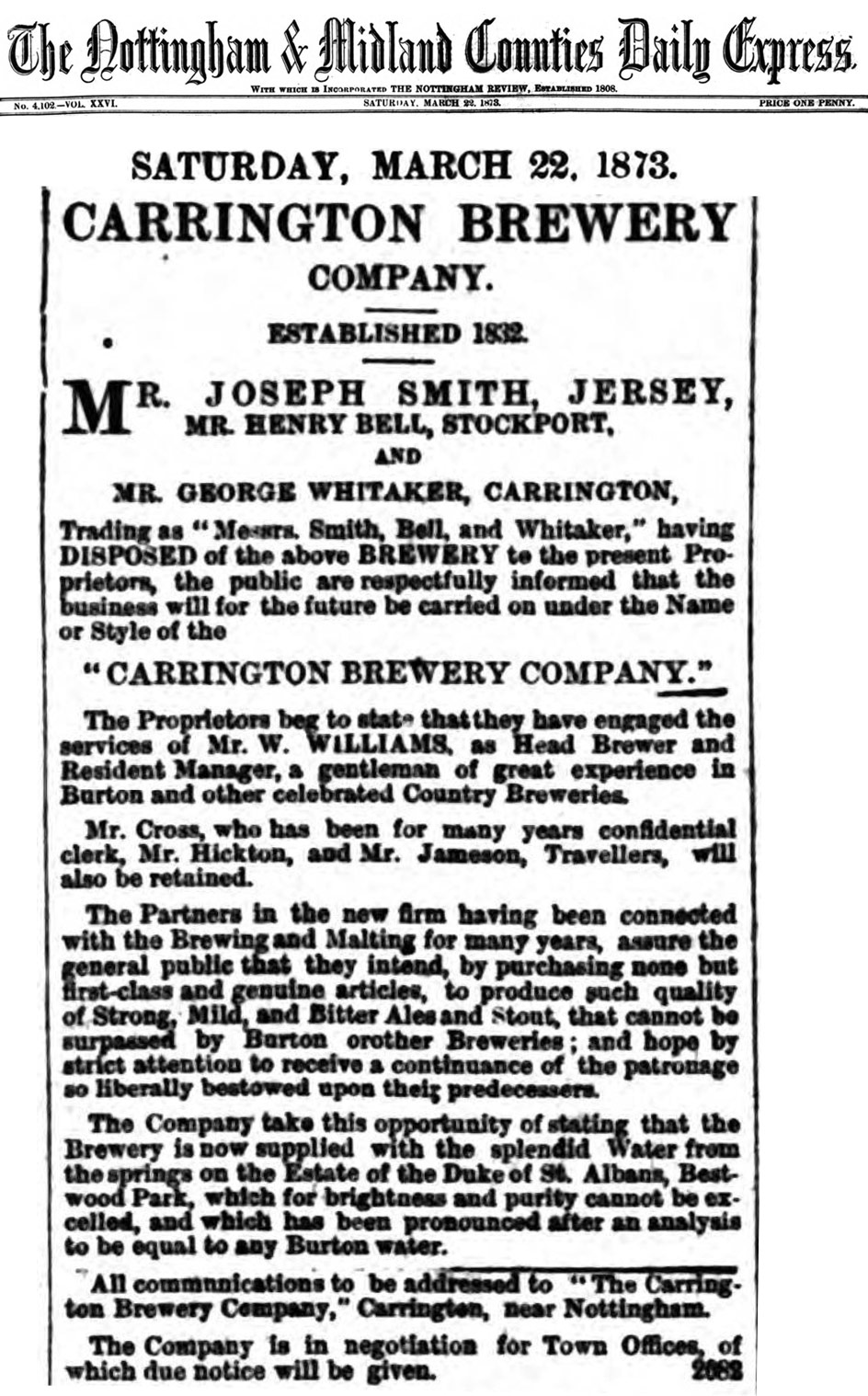
The next known location for William is Carrington, just outside of Nottingham, where a new brewery hired him as “a gentleman of great experience both in this country and in Germany…”. His fourth child, Amy Ellen, was born in Carrington in September 1873, but it appears the “well-known” brewery, under new management, was organized in March that year.
The following article from the local paper talks at length about the new brewery project and although there’s lots of self promotion and blather, it’s worth noting that William was only 33 years old and running a brewery.

It’s not clear when William moved from Carrington to Northampton – where he is in the 1881 census. His address is on the same street as the Northampton Brewery Company and he probably worked for them. My cousin has been in touch with the National Brewery Center who may have additional information in their archives – they’re currently closed (Covid-19 restrictions). The three Williams sons aren’t in Northampton – they’re all together, ages 15, 14 & 11, at Norton House College in Luton, Bedfordshire. Amy Ellen, 7, is with her parents.
The next stop on the brewery tour is in Derby at Stretton’s Derby Brewery, an established enterprise of the Stretton brothers that was taken public at the end of 1890 when one of the brothers, the head brewer, was in ill health and wanted to retire. The Derby paper has lots of detail about the prospectus and annual reports, although William Williams isn’t mentioned by name. The National Brewery Center had said: “William Williams with an address of 73 Ashbourne must have been Stretton’s Head brewer as that is the address of Stretton’s Derby Brewery. Moreover Williams would have been newly appointed given that the brewing Strettons (Frank was the brewer) all retired when the firm went public in 1890. A largely outside group, headed by RH Tennant but also including Campbell Praed (of Northampton.) took over and they had to appoint a new brewer, immediately.”
Things didn’t go smoothly for the new company. There was a sewage spill into the cellars when a city sewer overflowed and lots of beer had to be thrown out. In the second annual report in December 1892, in response to a shareholder question about profits, the auditor replied: “The real reason and the most serious reason for the profits falling off so largely arose from the fact that, about the month of June or July last year, a serious calamity overtook the brewery as was fully explained at the last meeting. Several bad brews were made, and nearly the whole of the brews for two or three weeks were returned to the brewery. The brewer had to be got rid of and another put in his place. Those bad brews seriously affected the trade…”
They never named the brewer – and when asked said they would not wash their dirty linen in public. It’s possible that William Williams was the person they fired. In 1894, another newspaper article refers to a Mr. Finch as Stretton’s brewer.
We next see William and Jane living in Forest Hill near her parents and her brother William Henry Hatfield, a doctor. The 1901 census has William retired and living on his own means in a comfortable terraced house on Gabriel Street. He died in 1907 of a cerebral hemorrhage, age 67, at a different house in Forest Hill; his son Walter Richard was “present at the death” and Jane’s brother, the doctor, certified the cause of death.

